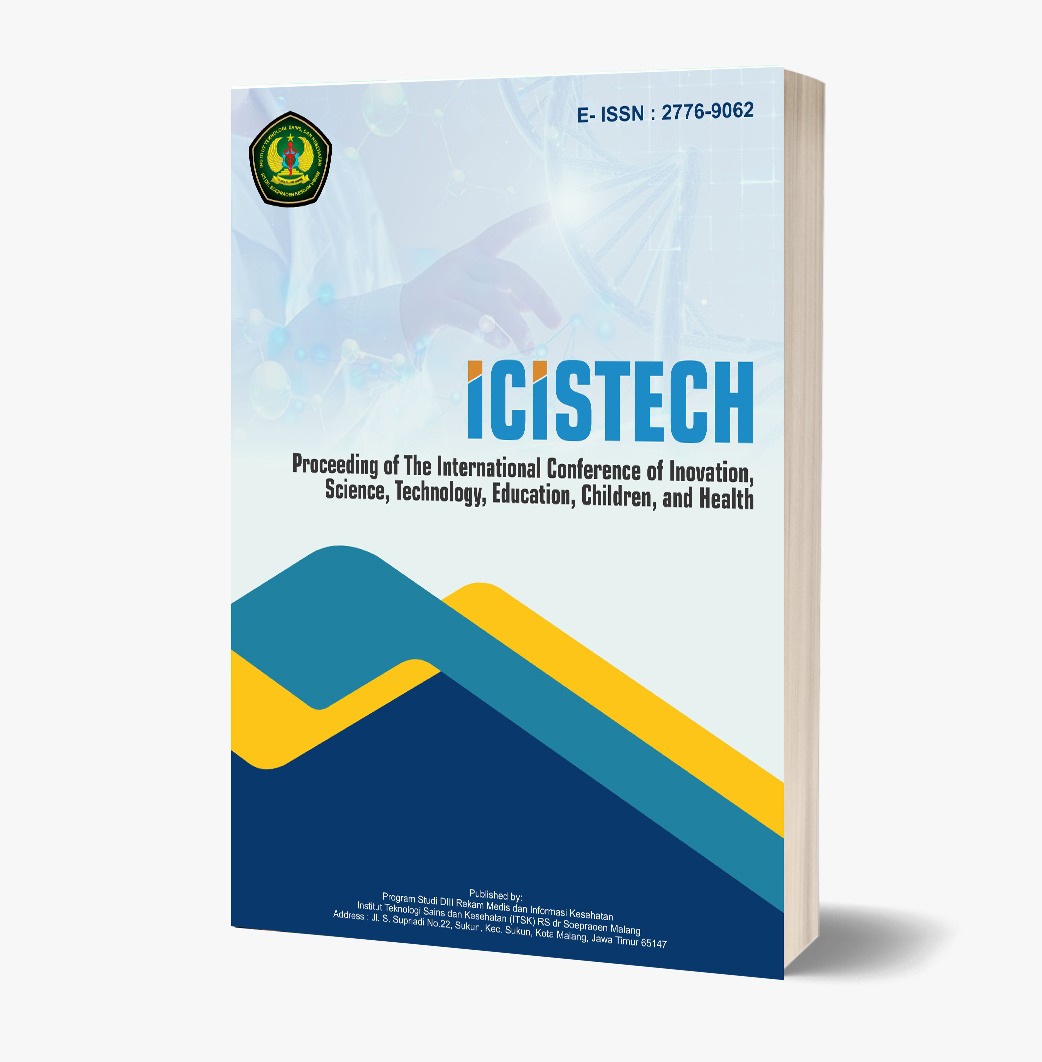The Impact of Work Experience, Knowledge, and Motivation on Cadre Performance in Stunting Prevention in Malang District
DOI:
https://doi.org/10.62951/icistech.v5i1.223Keywords:
Cadre Knowledge, Cadre Motivation, Cadre Performance, Cadre tenure, Preventing StuntingAbstract
Stunting is a critical issue that can be addressed through various interventions, one of which involves the active participation of community cadres. This study aimed to assess the role of knowledge and motivation as mediating factors between the duration of service as a cadre and their performance in the stunting prevention program at the Tajinan and Wagir Health Centers. The research used an analytic observational study design with a cross-sectional approach. The study population consisted of 608 cadres across two health centers, and a sample of 125 cadres from each health center was selected using proportional cluster random sampling. To analyze the data, an Independent Sample T-Test was used to compare the duration of service as a cadre, knowledge, motivation, and performance between the two health centers. Path analysis was conducted to explore the impact of the duration of service as a cadre on performance, mediated by knowledge and motivation. The results indicated that there were significant differences in the knowledge and performance of the cadres, while the duration of service and motivation did not show significant differences between the two health centers. Path analysis revealed that knowledge and motivation were not significant mediators in the relationship between the duration of service and cadre performance. Furthermore, the length of time as a cadre did not significantly impact performance in either health center. However, motivation emerged as the most influential factor, with a substantial effect on the performance of the cadres in both health centers. Based on these findings, it is recommended that stunting prevention programs focus on enhancing the motivation of cadres to improve their performance, rather than solely relying on the duration of their service or their knowledge levels.
References
Agustian, A. G. (2016). Revolusi mental berbasis ESQ: Kecerdasan emosi dan spiritual (Edisi pertama). Indonesia Arga Tilanta.
Akintola, O., & Chikoko, G. (2016). Factors influencing motivation and job satisfaction among supervisors of community health workers in marginalized communities in South Africa. Human Resources for Health, 14(54), 1–15. https://doi.org/10.1186/s12960-016-0151-6
Dinas Kesehatan Kabupaten Malang. (2016). Laporan Data Penilaian Status Gizi Balita 2016-2017. Dinas Kesehatan Kabupaten Malang.
Fatmawati, N. L. (2012). Hubungan motivasi kader dengan pelaksanaan peran kader posyandu di Kelurahan Sumbersari Kecamatan Sumbersari Kabupaten Jember. Universitas Jember.
Greenspan, J. A., McMahon, S. A., Chebet, J. J., Mpunga, M., Urassa, D. P., & Winch, P. J. (2013). Sources of community health worker motivation: A qualitative study in Morogoro Region, Tanzania. Human Resources for Health, 11, 1–12. https://doi.org/10.1186/1478-4491-11-52
Kane, S., Kok, M., Ormel, H., et al. (2016). Limits and opportunities to community health worker empowerment: A multi-country comparative study. Social Science and Medicine, 164, 27–34. https://doi.org/10.1016/j.socscimed.2016.07.019
Kementerian Desa, Pembangunan Daerah Tertinggal, dan Transmigrasi Republik Indonesia. (2017). Buku Saku Desa dalam Penanganan Stunting. Direktur Jenderal Pembangunan dan Pemberdayaan Masyarakat Desa.
Kementerian Kesehatan Republik Indonesia. (2011). Kemenkes No. 1955/MENKES/SK/XII/2019 tentang Standar Antropometri Penilaian Status Gizi Anak. Direktorat Jenderal Bina Gizi dan Kesehatan Ibu Anak.
Kok, M. C., Kane, S. S., Tulloch, O., et al. (2015). How does context influence performance of community health workers in low and middle income countries? Evidence from the literature. Health Research Policy and Systems, 13, 1–14. https://doi.org/10.1186/s12961-015-0001-3
Lukwan. (2018). Kontribusi pengetahuan kader terhadap kinerja kader posyandu di Puskesmas Matandahi Konawe Utara. Jurnal Penelitian dan Pengembangan Pelayanan Kesehatan. https://doi.org/10.22435/jpppk.v2i1.37
Mpembeni, R., Bhatnagar, A., LeFevre, A., et al. (2015). Motivation and satisfaction among community health workers in Morogoro Region, Tanzania: Nuanced needs and varied ambitions. Human Resources for Health, 13, 1–10. https://doi.org/10.1186/s12960-015-0035-1
Muzakkir, M. (2013). Faktor-faktor yang berhubungan dengan kinerja kader posyandu di wilayah kerja UPTD Puskesmas Kaledupa Kabupaten Wakatobi Provinsi Sulawesi Tenggara. Jurnal Ilmiah Kesehatan Diagnosis, 2, 136–142.
Namazzi, G., Okuga, M., Tetui, M., et al. (2017). Working with community health workers to improve maternal and newborn health outcomes: Implementation and scale-up lessons from Eastern Uganda. Global Health Action, 10, 71–81. https://doi.org/10.1080/16549716.2017.1345495
Roberton, T., Applegate, J., LeFevre, A. E., et al. (2015). Initial experiences and innovations in supervising community health workers for maternal, newborn, and child health in Morogoro Region, Tanzania. Human Resources for Health, 13, 1–12. https://doi.org/10.1186/s12960-015-0010-x
Rosdiana, Y., Widjajanto, E., & Kapti, R. E. (2018). Pengetahuan sebagai faktor dominan efikasi diri kader dalam melakukan deteksi dini gangguan jiwa. Jurnal Kedokteran Brawijaya, 30, 138–141. https://doi.org/10.21776/ub.jkb.2018.030.02.11
Singh, D., Negin, J., Orach, C. G., & Cumming, R. (2016). Supportive supervision for volunteers to deliver reproductive health education: A cluster randomized trial. Reproductive Health, 13, 1–10. https://doi.org/10.1186/s12978-016-0244-7
Susanto, F., Claramita, M., & Handayani, S. (2017). Peran kader posyandu dalam pemberdayaan masyarakat Bintan. Berita Kedokteran Masyarakat, 33, 13–18. https://doi.org/10.22146/bkm.11911
Sutiani, R., Lubis, Z., & Siagian, A. (2014). Gambaran pengetahuan dan keterampilan kader dalam pemantauan pertumbuhan bayi dan balita di wilayah kerja Puskesmas Desa Lalang Tahun 2014. Jurnal Gizi Kesehatan Reproduksi dan Epidemiologi, 1, 1–8.
Tim Nasional Percepatan Penanggulangan Kemiskinan. (2017). 100 Kabupaten/Kota Prioritas untuk Intervensi Anak Kerdil (Stunting). Tim Nasional Percepatan Penanggulangan Kemiskinan.
Tseng, Y., Griffiths, F., Kadt, J., et al. (2019). Integrating community health workers into the formal health system to improve performance: A qualitative study on the role of on-site supervision in the South African programme. Health Services Research, 9, 1–11. https://doi.org/10.1136/bmjopen-2018-022186
Vareilles, G., Pommier, J., Marchal, B., & Kane, S. (2017). Understanding the performance of community health volunteers involved in the delivery of health programmes in underserved areas: A realist synthesis. Implementation Science, 12, 1–12. https://doi.org/10.1186/s13012-017-0554-3
Wijaya, I. M. K., Murti, B., & Suriyasa, P. (2013). Hubungan pengetahuan, sikap, dan motivasi kader kesehatan dengan aktivitasnya dalam pengendalian kasus tuberkulosis di Kabupaten Buleleng. Jurnal Magister Kedokteran Keluarga, 1, 38–48.
Yanti, S. V., Hasballah, K., & Mulyadi. (2016). Studi komparatif kinerja kader posyandu. Jurnal Ilmu Keperawatan, 4, 1–11.
Downloads
Published
How to Cite
Issue
Section
License
Copyright (c) 2025 Proceeding of The International Conference of Inovation, Science, Technology, Education, Children, and Health

This work is licensed under a Creative Commons Attribution-ShareAlike 4.0 International License.













